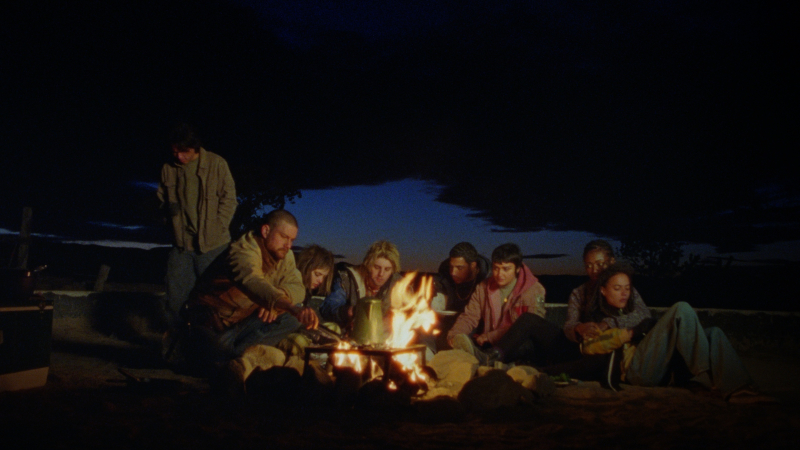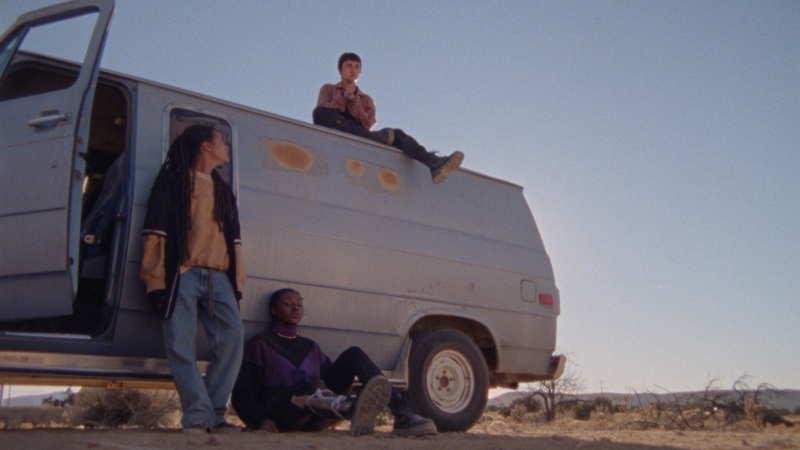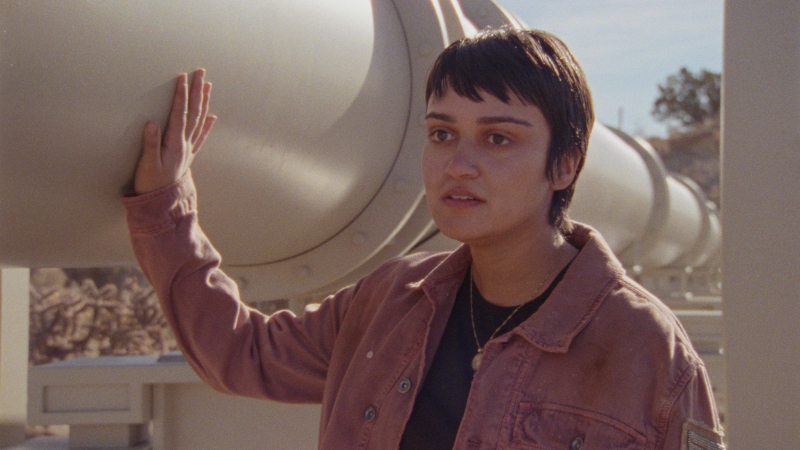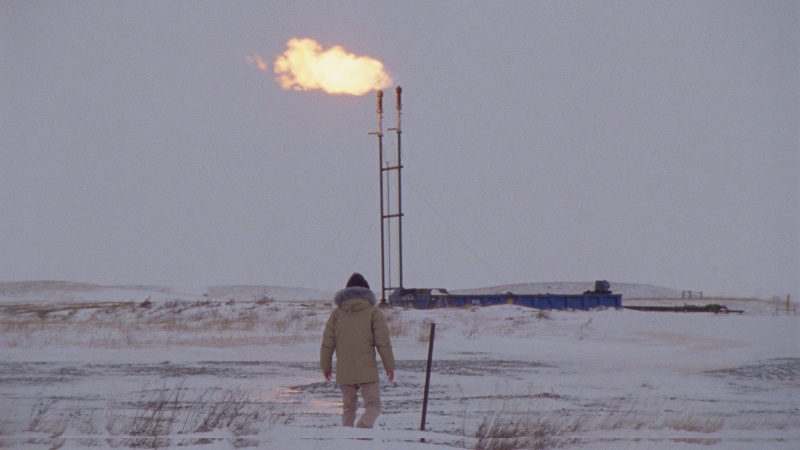Collaborators – Daniel Goldhaber, Ariela Barer, Jordan Sjol, Daniel Garber – 2022 – US – Cert. 15 – 103m
****
An eco-terrorism thriller based on the manifesto by Andreas Malm – out in cinemas in the UK on Friday, April 21st.
Credited as a film by its four main collaborators (its three writer-producers and its editor) rather than (as is the usual industry practice) merely its director Goldhaber (Cam, 2018), this is based on climate change activism apologist Andreas Malm’s non-fiction treatise which argues for the destruction of property e.g. fossil fuel industry infrastructure as part of the fight against the fossil fuel industry which is causing climate change. What the book doesn’t do is tell the reader the techniques and specifics that would enable them to actually blow up a pipeline.
Likewise, this movie doesn’t provide the viewer with the knowledge and technical wherewithal that would enable them to blow up pipelines after watching it. Like Malm, it offers moral justification(s) for the act. It shows a committed group of young people who have between them carried out extensive research into everything necessary for their planned act and reached a point of moral choice where they feel they have no other option than to carry out such an action. It also delves into the backstories of many of these activists to see how each of them have arrived at the opinions they now hold.

Various characters are established at the beginning, alone or in some cases in pairs or couples, then come together at a remote abandoned house in West Texas near the pipeline they wish to target. Michael (Forrest Goodluck) is a Native American who wants to push further than the protestors in his home community, and has developed considerable bomb-making expertise as an amateur. Theo (Sasha Lane) has contracted a rare form of leukemia from dancing in polluted rain from a nearby plant as a child so has nothing to lose; she and deeply thought-out activist Xochitl (Ariela Barer) have convinced Theo’s girlfriend Alisha (Jayme Lawson) to come along and be part of the operation. Rowan and Logan (Christine Froseth and Lukas Gage) are a young couple who seem to have romanticised the whole climate activism thing, their gung-ho story playing out like Bonnie and Clyde. Dwayne (Jake Weary) is a Texan whose family has been moved out of his hereditary home by legal structures which work against honest citizens in the interests of Big Oil. And Shawn (Marcus Scribner) has become frustrated with talking to media cameras, feeling that more concrete action is required.

Loosely speaking, it’s a thriller following the structure of that ever-popular crime movie subgenre, the heist movie. The heist movie is based around some sort of raid, often a bank robbery, for which there’s no arguable moral defence. The genre often (but not always) shows people making mistakes and consequently getting caught. So with that framework, the suggestion is that this will happen to our group of eco-terrorists in this film, which means that throughout the film, you’re waiting for something to go wrong and for some or all of them to get caught as a result. En route to the blowing up of the pipeline, things do go wrong (though it would be criminal to reveal exactly what and how) and there are consequences. But like the audience watching Norman Bates watching the car containing his murder victim’s body and personal effects sinking into the swamp in Psycho (Alfred Hitchcock, 1960), the audience in HTBUAP is constantly hoping these people are going to pull off their plan successfully and get away with it.

The following is intended as spoiler-free, but may also serve to keep you on the edge of your seat. Here are some of the (I repeat, spoiler-free descriptions of) things that go wrong. There are scenes detailing the building of explosives via complex chemical mixing / synthesising operations and setting up fragile detonators which can (and do) explode with the potentially fatal consequences. There is the transportation of extremely heavy oil drums filled with specially prepared chemical compounds with the potential to cause extreme physical injury should accident occur. There is a flashback in which, prior to the current operation and its personal associations, one of the activists gets caught by the FBI and pushed to act as an informer (shades of Reservoir Dogs, Quentin Tarantino, 1992) where one of the gang is an undercover cop). A scene is lifted straight out of Reservoir Dogs where one of the perpetrators gets shot by security guards and is bundled, bleeding, into the back of a friendly car.
Bringing things right up to date, an encounter with a security drone patrolling the pipeline could give the game away to the targeted oil company. The difference here is that unlike robbing a bank or killing someone, there is arguably a moral case for blowing up a section of pipeline. I’m not saying I agree with such arguments, but certainly something needs to be done to stop the planet’s ecosystem being altered so it will no longer be able to support human life. With the oil companies pursuing ‘business as usual’ as they have for several decades since they first knew there was a problem and in the absence of global governments in enough agreement that they can change the system fast enough to avert catastrophe (catastrophe which, as we all know, is already happening), political or other citizen-initiated action needs to be taken.

The heist narrative, the flashbacks, and the ease with which the latter move in and out of the former while maintaining considerable tension throughout the whole thing, is a testament to the consummate skill with which the whole has been cut together by editor Daniel Garber (who also cut Cam).
The other film that kept occurring to me as I watched was The Small Back Room (Michael Powell, Emeric Pressburger, 1949), an adaptation of a novel about British wartime back room boffins and bomb disposal. That film achieves terrific sequences of protagonists attempting to defuse bombs before they blow up in their faces; this current film achieves something similar in reverse, with characters putting together chemicals and assembling detonators for bombs which could very easily (and sometimes do) go off in their faces.
This film isn’t telling us (necessarily) to blow up pipelines, but it IS a call to action in the sense that, it’s a demand for radical change to happen and happen now. Human self-defence before we fry ourselves and the planet. See it, talk about it, and do something radical to save the planet. And if you just want a good, gripping thriller, it pulls that off too. Seemingly effortlessly.
How to Blow Up a Pipeline is released in the UK on Friday, April 21st.
Read my shorter, alternative review at Reform magazine.
Trailer:
